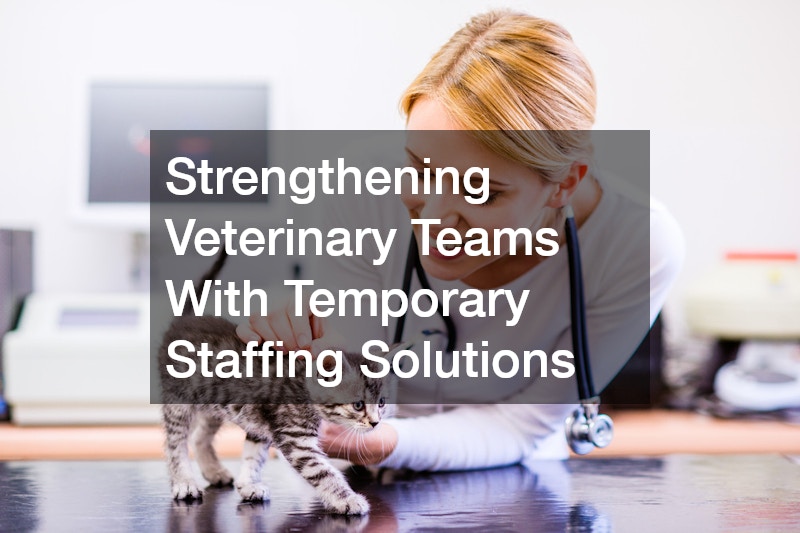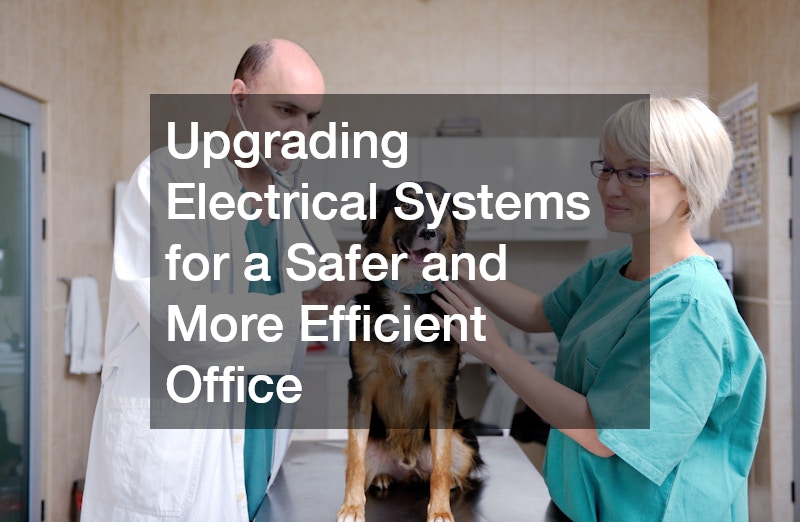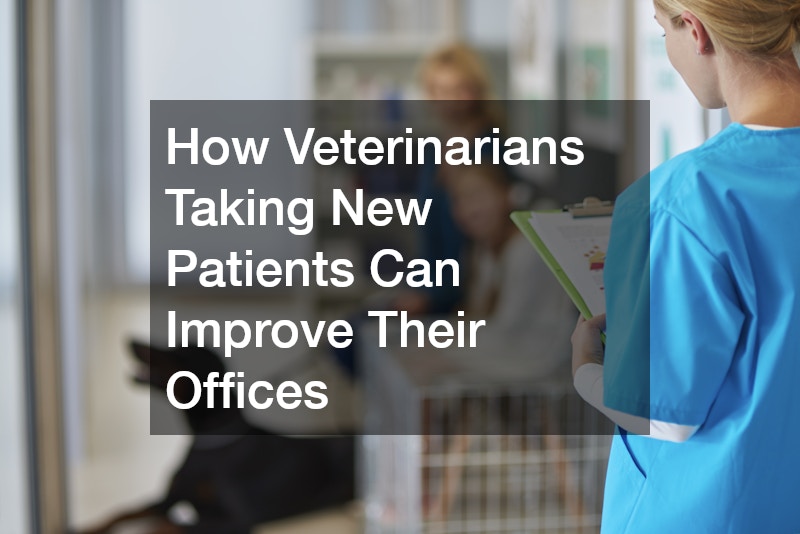How Veterinarians Taking New Patients Can Improve Their Offices

Introduction
For veterinarians taking new patients, maintaining a well-organized and efficient office is essential to providing high-quality care. As patient volume increases, the demands on a veterinary practice’s facilities, staff, and overall operations grow as well. A well-run office creates a comfortable and professional environment for pet owners while ensuring that veterinary staff can work effectively. From maintaining clean and inviting spaces to optimizing workflow and ensuring the right resources are available, small but strategic changes can make a significant impact on patient experience. A veterinarian’s office should not only meet the needs of pets and their owners but also support the well-being of the veterinary team, reducing stress and improving efficiency.
One often-overlooked aspect of running a veterinary practice is how logistical considerations—such as waste management and facility upgrades—affect the overall function of the business. Clinics accumulate significant waste from medical supplies, pet-related products, and general office operations, requiring an effective disposal system. Additionally, as veterinarians taking new patients expand their client base, they may need to renovate or redesign their spaces to accommodate the increased demand. Keeping up with these practical needs ensures that veterinary offices remain functional, hygienic, and welcoming to both long-time clients and first-time visitors.
Enhancing Waste Management Efficiency With Professional Services

A clean and organized veterinary office is essential for maintaining a safe and sanitary environment for both pets and people. As clinics grow and see more patients, the amount of waste produced—ranging from medical disposables to everyday trash—also increases. Without a structured waste management system, clutter and waste buildup can create an unprofessional atmosphere and even pose health risks. Proper disposal of biohazardous materials is particularly important in veterinary practices, as these items must be handled according to strict regulations. Investing in a waste management strategy that prioritizes efficiency, sustainability, and compliance helps create a well-maintained clinic that reflects professionalism and care.
Veterinarians taking new patients can benefit from working with a dumpster rental company to streamline waste removal and ensure compliance with local disposal regulations. With more clients coming in and the volume of materials being used daily, an effective waste management system prevents overflow issues and keeps the office running smoothly. Renting a dedicated dumpster for non-medical waste allows for regular pickups and reduces the risk of cluttered storage areas. Additionally, partnering with a reliable waste service provider ensures that biodegradable materials, recyclables, and general waste are sorted and disposed of responsibly. By integrating a professional waste management plan, veterinary offices can maintain a clean and welcoming environment while focusing on delivering excellent patient care.
Designing Functional Spaces to Accommodate Growing Client Needs
As a veterinary practice grows, its physical space must evolve to meet the increasing needs of patients and staff. A clinic designed for a small number of clients may struggle to accommodate an expanding patient base, leading to overcrowding, long wait times, and inefficiencies in workflow. Having well-organized spaces that separate waiting areas, treatment rooms, and administrative functions allows for smoother operations and a more pleasant experience for pet owners. Thoughtful space planning also helps ensure that veterinarians and technicians can move efficiently between tasks without unnecessary disruptions. Whether through simple rearrangements or major structural updates, optimizing the layout of a veterinary office is a crucial step in supporting continued growth.
Veterinarians taking new patients may find that working with professionals specializing in new construction can help them redesign their space to better suit their needs. Expanding a clinic to include additional exam rooms, a larger reception area, or even a designated space for specialty services can greatly enhance patient care. A well-planned renovation may also incorporate soundproofing in treatment areas to reduce noise stress for animals or install updated lighting to create a more calming atmosphere. By investing in functional design improvements, veterinary practices can ensure their facilities remain welcoming, efficient, and capable of handling the increasing demand for services.
Strengthening Veterinary Teams With Temporary Staffing Solutions

For veterinarians taking new patients, maintaining a well-staffed and efficient clinic is essential for providing quality care. As patient demand increases, the workload for veterinarians, technicians, and administrative staff can become overwhelming, leading to burnout and reduced efficiency. A well-balanced team ensures that appointments run smoothly, wait times are minimized, and every pet receives thorough attention. However, hiring full-time employees may not always be feasible, especially for clinics experiencing seasonal surges in patient volume or temporary staff shortages due to vacations, illnesses, or maternity leave. Finding a flexible staffing solution allows clinics to adapt to fluctuations in demand while maintaining a high standard of care.
Veterinary relief staffing can provide a practical solution for clinics that need additional support but do not require permanent hires. By working with temporary staffing agencies that specialize in veterinary professionals, clinics can bring in experienced relief veterinarians and technicians to fill in during busy periods or unexpected absences. This approach ensures that patient care remains consistent, even when regular staff members are unavailable. Relief staff can assist with routine appointments, emergency cases, and administrative duties, allowing full-time employees to avoid excessive workloads and burnout. By utilizing temporary staffing services, veterinarians taking new patients can continue to provide reliable and compassionate care without compromising efficiency.
Ensuring Comfortable Facilities Through Expert Climate Control
A comfortable environment plays a vital role in the overall experience of both pets and their owners when visiting a veterinary clinic. Temperature control is essential, as extreme heat or cold can make waiting areas and exam rooms uncomfortable, leading to increased stress for animals and dissatisfaction among clients. Additionally, proper ventilation helps maintain air quality, reducing the spread of allergens, odors, and airborne pathogens. Ensuring that a clinic’s heating and cooling systems are functioning efficiently is key to creating a welcoming and healthy space for patients and staff. Without reliable climate control, a veterinary office may struggle to provide a consistently pleasant experience, which can impact patient retention and overall business reputation.
Veterinarians taking new patients should consider partnering with a local heating contractor to ensure their facility’s climate control systems are up to date and operating efficiently. A professional contractor can assess the clinic’s heating and cooling needs, recommend energy-efficient upgrades, and perform regular maintenance to prevent unexpected breakdowns. Installing programmable thermostats, improving insulation, or upgrading to a modern HVAC system can help regulate temperatures more effectively while reducing energy costs. By working with experienced professionals, veterinary offices can create a more comfortable atmosphere that benefits both pets and their owners while ensuring staff can work in an optimal environment.
Upgrading Electrical Systems for a Safer and More Efficient Office

A veterinary clinic relies on a variety of electrical equipment, from medical devices and diagnostic tools to lighting and computer systems. As veterinarians taking new patients experience increased patient volume, the demand on their electrical infrastructure grows. Outdated wiring, overloaded circuits, or insufficient power supply can lead to disruptions in daily operations, affecting both patient care and administrative tasks. Electrical issues not only pose safety risks but also contribute to equipment malfunctions and reduced efficiency. Ensuring that a clinic’s electrical system is modern, reliable, and capable of handling increased demand is crucial for maintaining seamless operations.
Commercial electrician companies can provide veterinary offices with the necessary upgrades to support their expanding needs. A professional electrician can evaluate the clinic’s electrical system, identify potential hazards, and recommend improvements such as installing additional outlets, upgrading circuit breakers, or implementing energy-efficient lighting solutions. These upgrades not only enhance safety but also improve the functionality of essential medical equipment, ensuring that veterinarians can provide uninterrupted care. By investing in professional electrical services, veterinarians taking new patients can create a more efficient, reliable, and technologically advanced practice that meets the growing needs of their clients.
Protecting Clinic Facilities With Reliable Roofing Solutions
A veterinary clinic’s exterior plays a crucial role in maintaining a safe and professional environment for pets, clients, and staff. One of the most important structural components of any clinic is its roof, which protects the building from weather damage, regulates indoor temperatures, and contributes to overall energy efficiency. A poorly maintained or aging roof can lead to leaks, mold growth, and insulation problems, which may disrupt daily operations and create an uncomfortable environment for animals. Since veterinarians taking new patients often experience increased foot traffic and operational demands, ensuring the clinic’s infrastructure is in excellent condition is essential for long-term success.
Veterinarians taking new patients can benefit from working with a local roofing contractor to assess, repair, or replace their clinic’s roof as needed. A professional roofing company can inspect for leaks, reinforce structural integrity, and recommend energy-efficient materials that help regulate indoor temperatures. Whether it’s a minor repair or a full roof replacement, investing in high-quality roofing services prevents costly damage and ensures a secure, well-maintained facility. By addressing roofing concerns proactively, veterinary clinics can maintain a welcoming and protected environment that supports their growing practice.
Enhancing Safety and Cleanliness With Durable Flooring Solutions

The floors of a veterinary clinic endure significant wear and tear from high foot traffic, pet movement, and exposure to spills and cleaning chemicals. A durable, non-slip, and easy-to-clean flooring system is essential for maintaining a safe and sanitary environment. Traditional flooring materials such as tile or laminate can become worn out over time, developing cracks and stains that harbor bacteria. Additionally, slick surfaces increase the risk of falls, posing safety hazards for both pets and staff. For veterinarians taking new patients, upgrading to a high-quality flooring solution can improve both the clinic’s aesthetics and its functionality.
Applying concrete floor coating can provide veterinary offices with a durable, low-maintenance flooring solution that withstands daily use. This type of coating creates a seamless, non-porous surface that resists stains, moisture, and bacterial growth, making it ideal for medical environments. It also enhances traction, reducing the likelihood of slips and falls for both staff and animals. A professionally applied coating can be customized in color and texture to create a polished, professional appearance while improving overall hygiene. By investing in a high-performance flooring solution, veterinarians taking new patients can ensure their clinic remains a safe, clean, and efficient space for years to come.
Improving Curb Appeal and Accessibility With Quality Paving
A veterinary clinic’s exterior is the first thing clients see when they arrive, and a well-maintained parking lot and walkway contribute to a positive first impression. Cracked pavement, uneven surfaces, and poorly marked parking areas can create accessibility challenges for clients, particularly those with mobility issues or pets that are anxious on unstable ground. Additionally, a neglected parking lot may deter new clients, as it can make the clinic appear outdated or poorly maintained. For veterinarians taking new patients, upgrading outdoor surfaces ensures that their practice remains accessible, welcoming, and safe for all visitors.
Veterinarians taking new patients can work with a local paver supplier to enhance their clinic’s outdoor spaces by installing new pavement or repairing existing surfaces. High-quality pavers can improve the durability and aesthetics of parking lots, sidewalks, and entryways while providing a smoother, more stable surface for clients and pets. Professional paving solutions also offer drainage benefits, preventing water accumulation that can lead to hazards like ice patches or slippery conditions. By investing in well-designed, long-lasting pavement, veterinary clinics can create an inviting and professional exterior that reflects the quality of care they provide inside.
Maintaining a Reliable Cooling System for Pet and Client Comfort
Temperature regulation is a crucial factor in creating a comfortable environment for both pets and their owners. Veterinary clinics often deal with anxious animals that may become even more stressed in overly warm or poorly ventilated spaces. A malfunctioning air conditioning system can lead to discomfort, longer wait times, and even health risks for certain pets, especially during warmer months. Veterinarians taking new patients must ensure that their facilities maintain a stable indoor climate, as excessive heat can also negatively affect staff productivity and the proper functioning of medical equipment. Reliable cooling is essential for providing the best possible experience for clients, staff, and animals.
Working with an AC repair company can help veterinarians taking new patients prevent cooling system failures and maintain a comfortable clinic environment. Regular inspections and preventative maintenance, such as filter replacements and system tune-ups, can extend the lifespan of HVAC units and reduce the risk of unexpected breakdowns. If a system upgrade is needed, a professional can recommend energy-efficient options that improve air circulation and temperature control. By ensuring a well-maintained air conditioning system, veterinary clinics can create a welcoming space where clients and their pets feel at ease.
Supporting Pet Health With Holistic and Preventative Care Options
Modern veterinary care goes beyond treating illnesses—it also focuses on preventative care and overall wellness. Many pet owners are seeking more comprehensive healthcare options that support their pets’ long-term well-being. This includes natural treatments, nutritional counseling, stress management strategies, and alternative therapies that complement traditional veterinary medicine. Veterinarians taking new patients can enhance their practice by offering holistic wellness services that address the full spectrum of pet health needs. Providing these options not only attracts a wider client base but also ensures that pets receive well-rounded care tailored to their specific conditions and lifestyles.
Integrating holistic wellness services into a veterinary practice can include options such as acupuncture, chiropractic care, herbal remedies, and massage therapy. Nutrition-focused consultations and behavioral support can also play a role in promoting overall pet health. By incorporating holistic treatments alongside conventional medical care, veterinarians taking new patients can provide a more comprehensive approach to animal wellness. These services not only help manage chronic conditions and pain but also support preventative care, allowing pets to maintain optimal health throughout their lives. Offering a variety of treatment options can set a veterinary clinic apart and demonstrate a commitment to meeting the evolving needs of pet owners.
Conclusion
For veterinarians taking new patients, maintaining a well-equipped, comfortable, and efficient clinic is crucial for providing high-quality care and fostering client trust. From staffing solutions to facility improvements, each upgrade plays a vital role in enhancing operations, ensuring safety, and creating a welcoming environment for pets and their owners. Investing in infrastructure updates, professional partnerships, and holistic wellness services allows veterinary clinics to adapt to increased patient demand while improving overall service quality.
By working with industry professionals such as a local roofing contractor, an AC repair company, or a commercial electrician, veterinary clinics can ensure their facilities remain in top condition. Implementing durable flooring, reliable climate control, and modern electrical systems enhances daily functionality and promotes a seamless experience for clients. Additionally, incorporating veterinary relief staffing and holistic wellness options can improve patient care and expand service offerings. With these improvements in place, veterinarians taking new patients can confidently grow their practice while maintaining high standards of care and client satisfaction.
